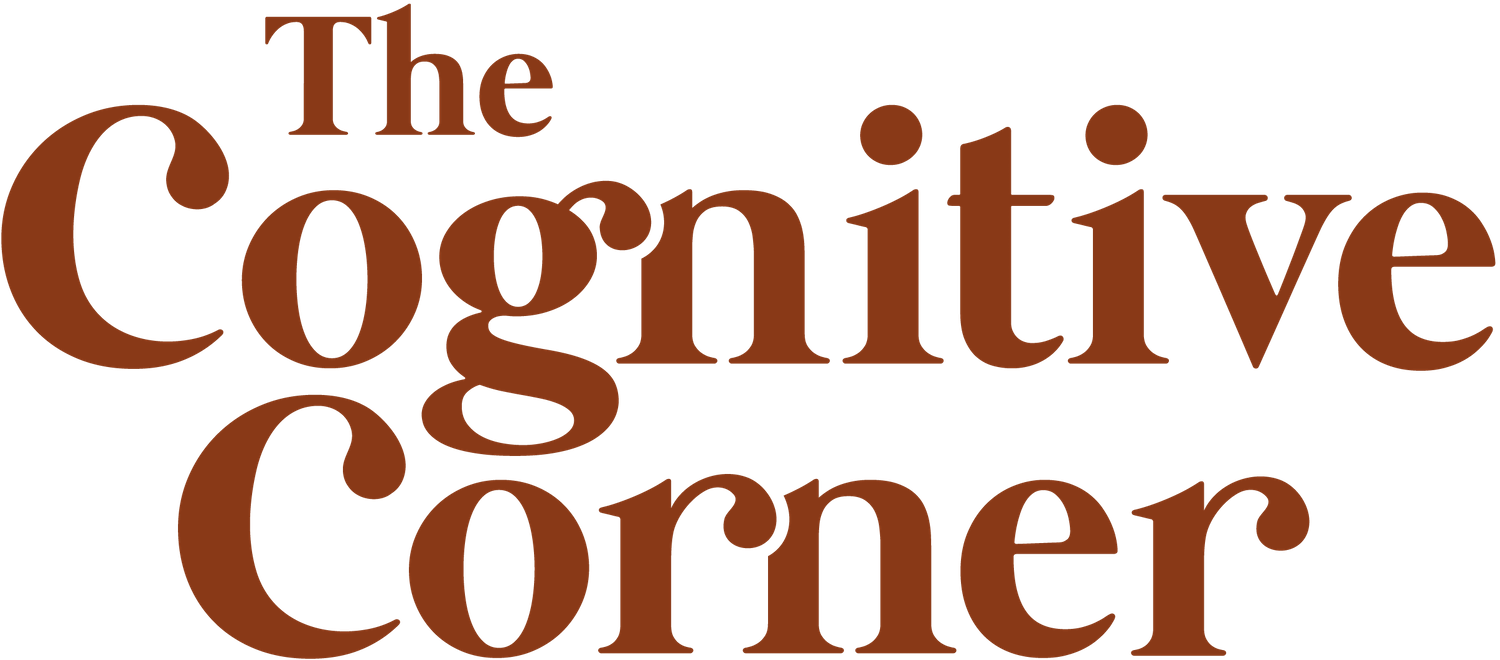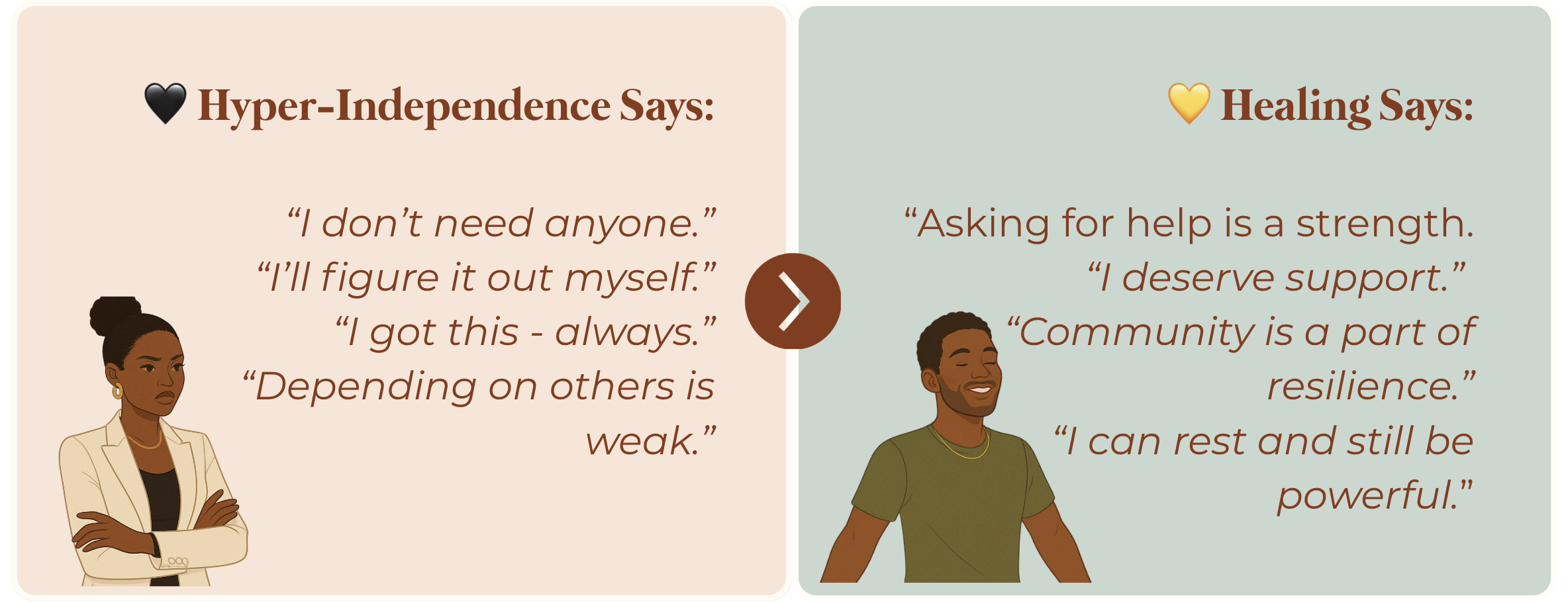Hyper-independence in the Black Community: When Asking for Help Feels Unsafe
You’ve learned to rely on yourself because, somewhere along the way, it stopped feeling safe to rely on anyone else
Have you ever caught yourself carrying way too much, both physically and emotionally too because the thought of asking for help makes you want to crawl into a deep dark hole? That might be hyper-independence. This isn’t about being strong or capable. It’s about the pressure to always be strong, to never drop the ball, never lean on anyone, and never show struggle. For many Black people, that pressure isn’t random - it’s shaped by survival. Generations of the community needing to hold it all together in the face of racism, injustice, and systems that haven’t always been safe. Hyper-independence can feel empowering at first, but over time, it can leave you feeling isolated, exhausted, and disconnected. It can make rest feel unsafe and support feel like a weakness.
Where Hyper-independence in Black Communities Comes From:
In a lot of Black communities, especially for women, there’s this expectation to carry a lot on your shoulders. From a young age, there can be an overwhelming amount of pressure to be responsible, selfless, and emotionally strong, even when you're still figuring things out yourself.
One example of this is Eldest Daughter Syndrome. If you're the oldest daughter in your family, chances are you've been seen as the second mom. This could look like cooking dinner, helping younger siblings with homework, de-escalating family conflicts, or just being the “go-to” for everyone’s needs. You’re expected to have it all together before you’ve even had the chance to just be a kid.
On top of that, there’s the Strong Black Woman/Man narrative which is a cultural expectation that you should always be put together, resilient, and emotionally tough no matter what. It sounds empowering on the surface, but it can also feel super isolating and exhausting. You’re not really given space to be vulnerable or simply human and are less likely to reach out for support.
This doesn’t just pop up out of nowhere - here are a few other common roots:
Experiencing abuse — physical, emotional, or mental
Dealing with bullying, neglect, or harassment
Mistrust in systems (healthcare, education, etc.)
Intergenerational trauma and survival mechanisms
Signs of Hyper-independence:
If you are not sure if what you’re feeling really counts as hyper-independence, that’s totally understandable. It’s not always easy to spot. Here are some signs that might be worth paying attention to:
Struggling to trust others to get tasks done
Saying “I’m fine” or “I can do it” even when you’re clearly overwhelmed
Worried about what family members or friends might think of you
Feeling like you always must prove yourself or your value
Find it challenging to rest or just be still
Keeping your circle small (limiting relationships and closeness)
The Mental and Physical Health Impacts of Hyper-independence:
When this goes unchecked, it can really take a toll on your physical, mental, and emotional well-being, even if you don’t notice it right away. It can show up in your daily life, your relationships, your sleep, and more. Here’s how it might be showing up:
Pulling away from people and isolating yourself
Feeling anxious all the time or experiencing panic attacks
Zoning out and dissociating
Struggling with depression or low moods
Trouble with your sleep
Emotionally burnt out
Headaches, stomach issues, pain, etc.
These are all signs your body and mind are trying to tell you “Something’s off.” Recognizing this is the first step toward healing and getting the support you need!
How Can Therapy Help Break the Cycle of Hyper-independence?
Hyper-independence and trauma are very connected. A lot of the time, being ultra-independent can be a way of protecting yourself after hard or painful experiences. That’s why therapy can be a game-changer — it helps you see patterns, work through past trauma, and better understand what’s really going on.
Plus, a good therapist can help you feel more at ease asking for help and point you toward tools and resources that work best for you.
There are many different therapy styles out there, especially ones catered to trauma. A few worth knowing about:
EMDR (Eye Movement Desensitization and Reprocessing) – uses eye movements, tapping, or sounds to help your brain reprocess tough memories.
ART (Accelerated Resolution Therapy) – uses imagery and eye movements to shift the way trauma is stored in the brain.
Somatic Therapy – focuses on how trauma lives in the body through breath, movement, and physical sensations.
Depth Hypnosis – combines mindfulness, body awareness, and hypnotherapy with elements from ancient healing practices.
Therapy can also help you retrain your thoughts and build new, healthier ways of thinking and connecting. Below are just a few examples:
Culturally Responsive Therapy in Canada:
At TCC, we’ve got a diverse team of culturally responsive therapists who want to help — and we’re here to support folks from all backgrounds.
We know starting therapy can feel a little overwhelming, so to make things easier, we offer free 15-minute consultations to help you figure out what you need and where to begin.
Not sure who would be the best fit? We’ve also got a quick therapist matching tool to help you find a therapist that aligns with your needs and feels like the right fit!
Too Long, Didn’t Read:
Hyper-independence is feeling like you have to do everything on your own, even when it negatively impacts you.
It’s often tied to trauma.
Things like intergenerational trauma, abuse, expectations, and harmful stereotypes can all play a part in why this shows up, especially for people in the Black community and other marginalized groups (think Eldest Daughter Syndrome or the Strong Black Women narrative).
If you’re feeling overwhelmed, struggling to trust others, or tend to limit your relationships... these might be signs.
Hyper-independence can take a toll on your mental, emotional, and physical health.
Therapy (including trauma-informed methods like EMDR and ART) can help you unpack this and start your healing journey!
Conclusion:
If you’ve been reading along this whole time, and feel like this might be you, just know you’re not alone. Hyper-independence might have started as a protective mechanism, but you don’t have to carry everything on your own. This kind of coping can be especially common in the Black community and other marginalized groups, where trauma, stigma, and mistrust run deep. Just remember, healing is possible. Whether it’s exploring therapy, educating yourself, or reaching out for support — you deserve it!
Resources:
Hyper-independence and why it is a trauma response. The Brown Perfection. (2023, March 13). https://thebrownperfection.com/2023/03/13/hyper-independence-and-why-it-is-a-trauma-response/
Staff, Newport Institute (n.d.). What is hyper-independence trauma in young adults? https://www.newportinstitute.com/resources/mental-health/hyper-independence-trauma/
Buchwald, N. (2025, January 28). Understanding hyper-independence: Is it a trauma response?. Manhattan Mental Health Counseling. https://manhattanmentalhealthcounseling.com/understanding-hyper-independence-is-it-a-trauma-response/
Seidu, B. (n.d.). What eldest daughter syndrome is and how it’s plaguing Black Girlhood. GROWN. https://grownmag.com/lifestyle/what-eldest-daughter-syndrome-is-and-how-its-plaguing-black-girlhood/



